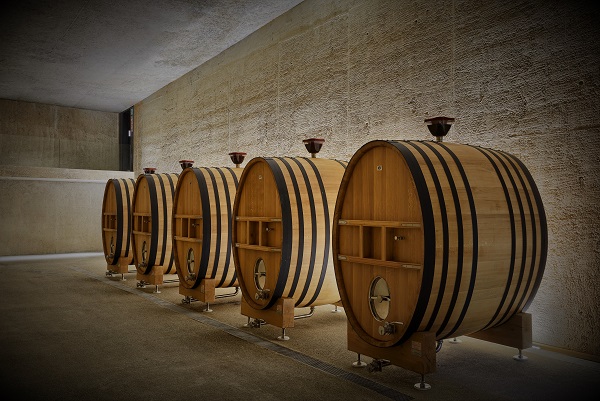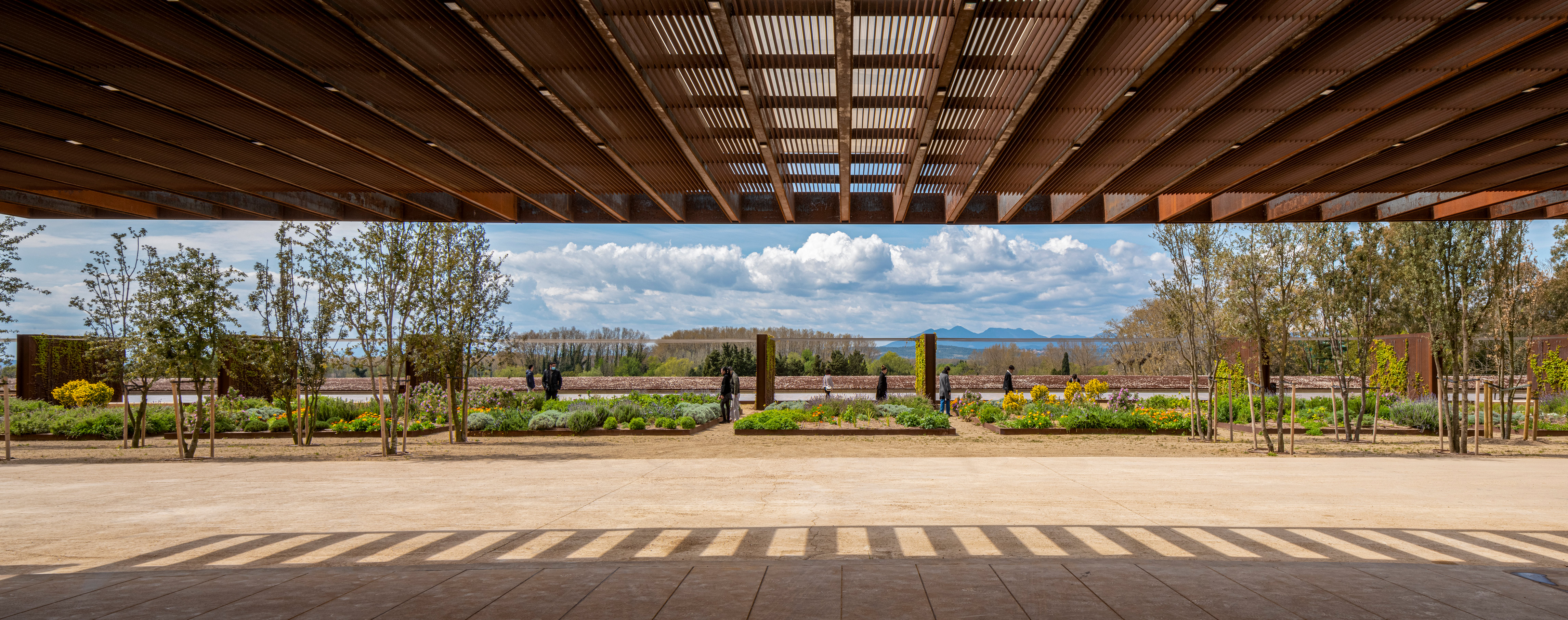Sustainable practices extend from the 150ha of vineyards to the new €40m winery, which uses geothermal energy, sustainable materials and processes, thermal insulation, and a great deal of natural lighting. The electricity used comes from 100% certified renewable energy. Many of the materials used are recycled or locally sourced, and all the wood is FSC (Forest Stewardship Council) certified.
One example of the creativity used in the sustainable construction is the deep foundations, which make it possible for the building to connect with geothermal layers. With 538 piles installed at a depth of between 8 and 20 metres, the building has 331 piles that are used to exchange heat with the ground to reduce heating, cooling and hot water energy consumption for an energy saving of about 37%.
The third generation of the Suqué Mateu family opened the new winery last year – the first in Europe to be awarded the highest rating for sustainable construction, the LEED Gold certificate. Semi-submerged in the landscape, the two-level winery has a ten-metre difference between the grape reception area and the lower winemaking, ageing and refining floor, so pumping is kept to a minimum.

Javier Suqué (above, left), president of Grup Peralada, says: “We started to develop the idea of building a new winery in Peralada (the local village) more than 20 years ago. In my mind I envisioned a project that would enhance the value of Peralada’s winemaking tradition, while also taking an ambitious look towards the future. Today, and even though it might sound clichéd, it’s a dream come true, and I look back on the road it took to get here with great satisfaction.”
Based in the oldest wine region in the Iberian Peninsula, Perelada plans to have all its vineyards certified organic by 2025 and to advance towards regenerative agriculture in the coming years.
The five-site business is also working on measures such as irrigation with recovered wastewater from treatment plants, something done at the flagship Garbet vineyard for 25 years, or half-buried irrigation, which reaches the roots much earlier than above-ground irrigation and prevents wastage, a process already used in the vineyards surrounding the new winery (below).

Water usage is also reduced inside the building, with the combination of efficient taps and rainwater, and outside in the garden by using rainwater from a 700m3 storage tank. The open shaded areas outside are maximised using Mediterranean plants and light-coloured paving.
Meanwhile, the new winery, the family says, is helping it make “a new leap in quality”, as it includes 188 tanks “to take the meticulous grape selection to the extreme” by separating grapes according to the different soils of the various Perelada estates.
Also to increase quality, the winery has installed an Intranox Oresteo system, which eliminates the need for pumpovers or batonnage during vinification and allows the winemaking team to produce wines with lower SO2 content.
“We were already making excellent wines at Perelada, but the new winery is designed to create extraordinary ones: each with its own personality and the potential to go even further, to evoke emotion,” explains head winemaker Delfí Sanahuja (pictured with Javier above). “This winery gives us everything we need to get to where we want to go.”


Respect for differentiation is also evidenced in spaces like the Temple (above), where the wines are aged in concrete tanks, oak vats and 300L barrels, and where the winery can experiment with the right ageing for each vintage. The Temple is reserved for signature wines, such as Finca Garbet and Gran Claustro, special reserves and the Ex Ex (Exceptional Experiences), the result of the winery’s research programmes.
“We stand firm in our commitment to never stop innovating and surprising consumers with wines that are very much of the land, with a defined character, making the most of the region’s exceptional characteristics,” Delfí continues.
Eugeni Llos, manager at the winery, adds: “There are very few DOs with soils as different as the Empordà, and we want this richness and heterogeneity of the terroir to reflect in our wines. The new winery is evidence of our commitment to quality wines and gives us the opportunity to move forward by pouring this love for our land into every bottle.”
The oenological improvements can already be seen in the young wines vinified in the new facilities, such as Collection, Inspirador, and Cigonyes, which are wines with more fruit, balance, elegance, and freshness. This spring, the first high-end wines finished in the new winery will also hit the market. These include Finca Malaveïna 2020, Finca Espolla 2020, and two special wines to commemorate the centenary.

One is an organic brut cava (above) that reinterprets the first sparkling wine made in the original small winery under the Castell de Peralada, which was used by monks from the adjacent monastery. The other wine, Vino del Centenario (below), is a limited-edition red that pays tribute to the visionary dream of a family, a hundred years ago, to recover centuries of winemaking tradition in the Empordà region. It is made with the best grapes – Garnacha and Syrah – from Perelada's most emblematic estate, Garbet, and aged for 12 months in French oak barrels.

There are also two new wines:
- Amfitrió aims to symbolize the spirit of Perelada by blending local and foreign red grape varieties with Grenache in the lead, supported by Syrah, Merlot, Cabernet Sauvignon, and Samsó.
- Obsequi is a white wine made with Grenache Blanc and Sauvignon Blanc, a coupage that Perelada has offered to its most distinguished guests, from artist Salvador Dalí to author Josep Pla.


These new wines will be the first to use Perelada’s new bottle design, which is 100g lighter and rough-textured. Perelada aims to extend this bottle to “a large part of production”.
In the next five years, the company plans to launch more than 200 sustainability initiatives, with the purpose of making this a hallmark of its corporate identity. These objectives were announced recently by Javier Suqué and Delfí Sanahuja.
Centenary celebrations
Perelada will celebrate its centenary with an exhibition and immersive tastings at Centre d’Arts Digitals Barcelona next month. The four-day event is designed to transport attendees to Perelada, its spirit and its history, through different spaces and experiences using immersive digital arts. It will combine oenology, gastronomy, art, and music. On May 6 and 7, it will be open to the public, who can enjoy the experience and try some of Perelada’s wines for €15.Sustainable wine tourism
There are parking spaces for bicycles and electric vehicle charging points at the complex, which includes the Castell de Peralada and the Monastery of Carme, with its Gothic church and cloister from the 14th century. The complex also includes the five-star Hotel Peralada, a wine spa, golf course, casino, library, gardens, and wine museum with a glass and ceramic collection. The Hispano Suiza room contains a collection of cars from the automobile brand co-founded by Damià Mateu.There are four places to eat: the Castell Peralada restaurant (with one Michelin star), the L'Olivera restaurant, the Shiro by Paco Pérez, and the Celler 1923 wine bar, developed in collaboration with Paco Pérez, where visitors have the opportunity to taste dishes inspired by Empordà cuisine of 1923, the year the winery was founded, and which pair with Perelada wines.
Cultural activities reach their peak in July and August, when the Peralada Castle hosts the Castell de Peralada Music Festival.

 English
English French
French







.png)


